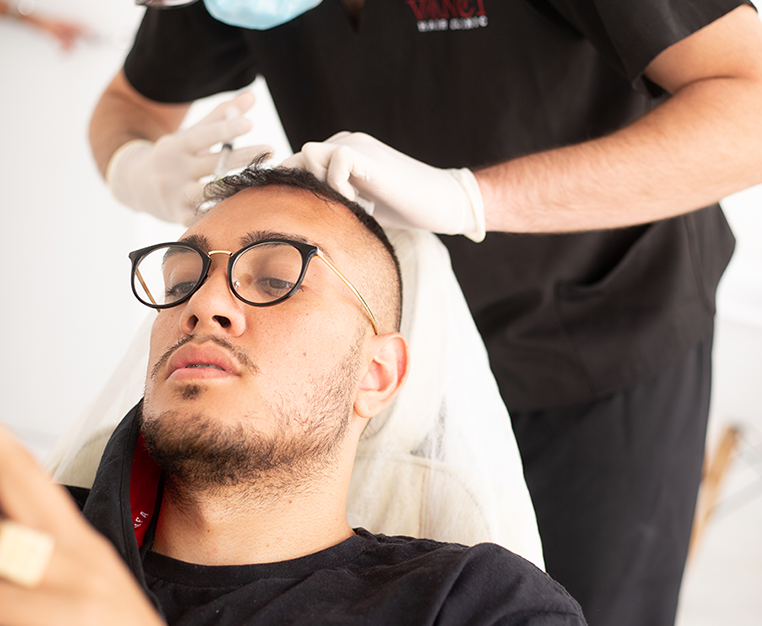There’s a National Day for anything and everything, it seems. A quick check of the internet turns up a National Bloody Mary Day, a National Cream Puff Day and a National Hugging Day. And that’s just in January! Oddly, there isn’t a National Hair Transplant Day. Why is that odd? Well, the global hair transplant market was worth nearly $5 billion in 2021 and is projected to reach $30 billion by 2031 according to a recent report. Surely, that sort of economic activity is worth twenty-four hours of reflection, celebration and promotion, or whatever it is these National Days are about?
Let’s look at the reasons why hair transplants don’t make the National Day cut. Keep reading!
Epidemic
The American Hair Loss Association (AHLA) estimates that 85% of men have noticeably thinning hair or have lost it altogether by the age of fifty. While the figures are lower for women, they are still significant; approximately 40% of women will be affected by female pattern hair loss (FPHL) by the time they reach fifty.
If the same number of men and women were being affected by any other disease, it would be labelled an epidemic, and any effective treatment would be welcomed and promoted. And yet, even though millions of people around the world get hair transplants every year, the procedure receives little promotion outside the hair restoration business.
Why is There a Reluctance to Discuss Hair Transplants?
While things are slowly changing, most hair transplants are still carried out on men. Figures produced by the International Society of Hair Restoration Surgery (ISHRS) reveal that 87% of people getting hair transplants in 2021 were male. And therein lies the problem, perhaps. Research has shown that females are more likely to be proactive and engaged in discussing health-related issues. If more women were getting hair transplants, therefore, chances are the whole issue wouldn’t be ignored in the way it is. Men, on the other hand, are not good at discussing health issues. And make no mistake, hair loss is a mental health issue.
Hair loss and Mental Health
For thousands of years, long hair has been linked to strength, masculinity and virility in men and fertility and youth in women. So, when our hair starts to fall, it can be a significant blow to the psyche. Studies have shown that it can have a major impact on an individual’s self-esteem and confidence. This can sometimes tip into depression. Why do guys find it hard to open up about health issues?
Some of that is down to old-fashioned gender stereotyping. Even in these supposedly enlightened times, there persists the idea that ‘real men’ should be strong and in control. Big boys don’t cry and all that. Men are expected to be tough and virile, and talking about concerns you have about hair loss doesn’t sit easily with that. Admitting that it bothers you at a deep level, to the extent that you would go for surgery to fix it, is like an admission of weakness.
And this reticence has real-life consequences. Health statistics in general, and mental health statistics specifically, show that men fare less well than women in nearly every category. Only one-third of NHS referrals for talking therapies are for men, while suicide rates for men are three times as high as for women.
Bald is Beautiful?
Yet, there is plenty of research out there to suggest that some women find bald men attractive, more confident and masculine, in fact, than guys with a full head of hair. That being so, why does the prospect of hair loss fill men with dread?
The problem, perhaps, is that the image of the beautiful bald man portrayed in the media is wrapped up in other things, too. The beautiful bald man is usually a film star (Jason Statham, Vin Diesel, Dwayne Johnson) or an athlete (boxer Floyd Mayweather or basketball player Michael Jordan, for example). Their baldness comes wrapped in a buff physique that’s got Hollywood glamour, success, money and power stamped all over it. Ordinary Joes look at that and see no connection to their own baldness. If anything, it serves to undermine their self-esteem even more.
Final Thoughts
Not everyone who is experiencing hair loss or thinning will require a hair transplant. There are other effective non-surgical treatments available that may be more suitable for a particular case or individual. A consultation with a hair expert will help you decide which treatment is best for your needs.
Vinci Hair Clinic can help with that. We have hair experts who stand comparison with the best in the business, and we offer a free, no-obligation consultation to all our new clients. Your consultation can take place in person at one of our many state-of-the-art clinics around the world or over the phone, using photographs. Get in touch with us and make an appointment today!



